Benzodiazepine Addiction: Definition, Types, Symptoms, Causes, Effect and Treatment
Benzodiazepine addiction refers to the state in which an individual develops enhanced tolerance for the benzodiazepine medication, leading to continued usage despite risks. Benzodiazepine is used to treat anxiety and insomnia-related complications.
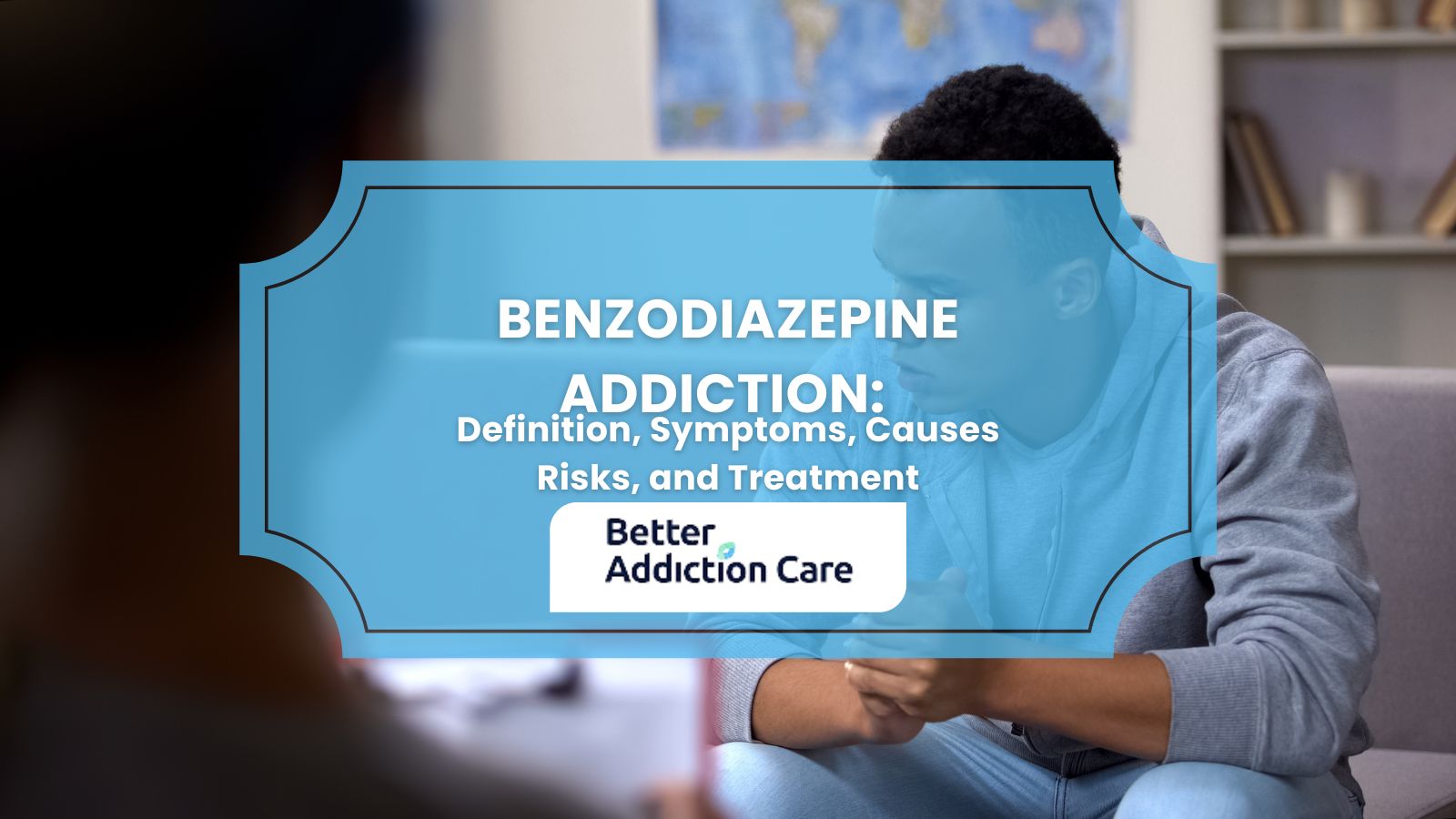
Benzodiazepine addiction refers to the state in which an individual develops enhanced tolerance for the benzodiazepine medication, leading to continued usage despite risks. Benzodiazepine is used to treat anxiety and insomnia-related complications.
Types of benzodiazepine addiction are characterized by the misuse of medications such as Xanax, Klonopin, Ativan, Valium, Restoril, and Librium, each resulting in physical and psychological dependence.
The signs and symptoms of Benzodiazepine include drowsiness, dizziness, blurred vision, slurred speech, memory problems, confusion, mood swings, decreased focus, doctor Shopping, escalating use, and hiding consumption.
The causes of Benzodiazepine addiction include prescriptions for chronic anxiety or insomnia, tolerance, mental health conditions, self-medication, history of substance abuse, psychological factors, and environmental factors.
Effects of benzodiazepine addiction include increased tolerance, compulsive use, sedation, and cognitive decline, all of which significantly impair an individual's physical and mental health. Furthermore, this addiction can lead to risky behaviors such as doctor shopping and poses a serious risk of overdose, underscoring the necessity for effective treatment and intervention.
The treatment options for benzodiazepine addiction are behavioral therapies, detoxification, support groups & rehab centers, and medications.
What is Benzodiazepine Addiction?
Benzodiazepine addiction is defined as the uncontrollable intake of the drug without a prescription. The sedative and calming effect of the drug makes it addictive. For diagnosis, there must be major impairment or distress present for at least over a year. according to DSM-5 criteria.
Long-term usage of benzodiazepines leads to side effects like addiction, dependency, and cognitive impairment (Management of benzodiazepine misuse and dependence, 2015). An individual with benzodiazepine addiction requires a constant increase in dosage for the initial therapeutic effects.
What Is The Prevalence Of Benzo's Addiction?
Benzodiazepines were found to be the third most commonly prescribed drug in 2017. 2.2% of the population in the US was using the drug, as per a study done on “The epidemiology of benzodiazepine misuse: A systematic review” by Victoria R Votaw.
There were almost 12,499 deaths related to Benzodiazepine addiction in 2021. 5.3 million people are addicted to benzodiazepine, as per Benzodiazepine addiction stats reviewed by Kent S. Hoffman, D.O.
What are Benzodiazepines?
Benzodiazepine is a medication that slows down brain activity by affecting the central nervous system. The sedating effect helps to soothe the brain, making it a good treatment for mental health conditions like anxiety, and depression. Benzodiazepines are tranquilizers and are highly addictive. The usage is monitored and only given upon prescription to avoid the risk of addiction. Benzodiazepines are often referred to as Benzos and come under other names as well like Valium and Xanax.
What Is The History Of Benzodiazepines?
The first form of Benzodiazepine was discovered in 1955 by a chemist named Leo Sternbach and by 1960, Benzodiazepine was termed as Librium, and other forms were being identified to enhance the effects. In 1963, Valium was discovered as another form. Benzodiazepines were found to be less toxic in contrast to other drugs. Medical experts welcomed its usage, making it one of the most popular medications in the late 1970s. In 1980 concerns regarding its dependence and addiction started to emerge. Benzodiazepine addiction is still a common concern even with its proven medical benefits.
Are Benzodiazepines Legal?
No, benzodiazepines are not legal. Benzodiazepine is a Class C drug and possessing it without a prescription is illegal. Possession and selling activities lead to imprisonment or a fine. Benzodiazepine usage is always monitored and controlled by a medical expert having the right to prescribe it.
What are The Types of Benzodiazepine Addiction?
The types of benzodiazepine addiction include Xanax, Klonopin, Ativan, Valium, Restoril, and Librium addiction, each with distinct characteristics and withdrawal concerns
The main types of benzodiazepine addiction are listed below
Xanax Addiction
Xanax addiction is the compulsive use of Xanax (alprazolam), a fast-acting benzodiazepine prescribed for anxiety and panic disorders but highly addictive when misused. Symptoms of Xanax addiction include drowsiness, confusion, memory problems, and withdrawal symptoms like seizures and rebound anxiety. Treatment options for Xanax addiction include medically supervised detox, gradual tapering, cognitive-behavioral therapy (CBT), and support groups.
Klonopin Addiction
Klonopin addiction develops from the misuse of clonazepam, a long-acting benzodiazepine prescribed for seizures and anxiety disorders, which leads to dependence. Symptoms of Klonopin addiction include sedation, impaired coordination, and withdrawal symptoms like tremors and insomnia. Treating Klonopin addiction requires a gradual tapering plan under medical supervision, along with therapy and lifestyle changes to support recovery.
Ativan Addiction
Ativan addiction stems from the misuse of lorazepam, a benzodiazepine commonly prescribed for anxiety and insomnia, which results in physical and psychological dependence. Symptoms of Ativan addiction include memory loss, mood swings, and withdrawal symptoms like heightened anxiety and muscle spasms. Effective treatment for Ativan addiction includes medically supervised detox, counseling, and long-term strategies to prevent relapse and manage anxiety.
Valium Addiction
Valium addiction arises from the misuse of diazepam, a benzodiazepine prescribed for anxiety, muscle spasms, and alcohol withdrawal, leading to dependency over time. Symptoms of Valium addiction include drowsiness, slurred speech, and withdrawal symptoms like irritability and hallucinations. Treatment for Valium addiction involves a slow tapering process, therapy to address the root causes of addiction and participation in recovery support groups.
Restoril Addiction
Restoril addiction arises from the misuse of temazepam, a benzodiazepine prescribed for insomnia, which leads to tolerance and dependence. Symptoms of Restoril addiction include excessive sleepiness, confusion, and withdrawal symptoms like rebound insomnia and agitation. Treatment options for Restoril addiction include medically supervised detox, behavioral therapy, and lifestyle changes to improve sleep hygiene.
Librium Addiction
Librium addiction develops from the misuse of chlordiazepoxide, a benzodiazepine primarily used to treat anxiety and alcohol withdrawal, which leads to dependency when abused. Symptoms of Librium addiction include fatigue, dizziness, and withdrawal symptoms like tremors and panic attacks. Treatment options for Librium addiction involve gradual tapering, counseling, and addressing co-occurring substance use disorders.
What Are The Common Methods of Benzodiazepine Use?
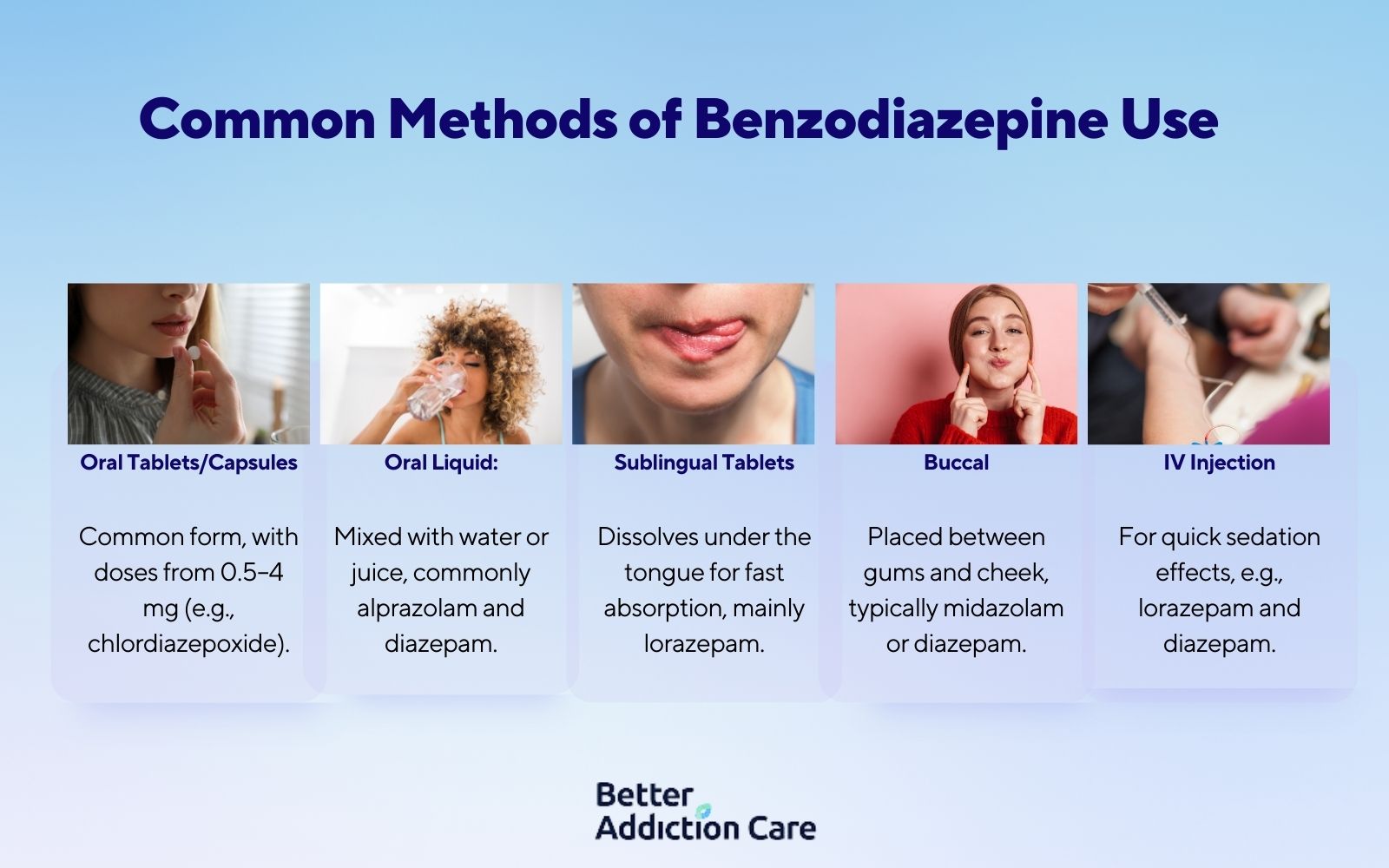
The 5 methods of Benzodiazepine usage are oral tablets or capsules, oral liquid, sublingual tablets, buccal administration, and IV injection.
The main methods of Benzodiazepine intake are listed below:
-
Oral tablets or capsules: Benzodiazepines are taken orally in the form of a tablet. The dosage starts from 0.5mg and ranges between 1-4 mg as per prescription. Chlordiazepoxide and oxazepam are capsules form of the medication that are used to treat anxiety.
-
Oral liquid. Benzodiazepine in the form of oral liquid is taken immersed in another liquid like water or juice. Alprazolam and Diazepam are the main forms of this liquid medicine, also available in orally dissolving tablets.
-
Sublingual tablets: Benzodiazepine in the sublingual tablets form is placed under the tongue until dissolved. Lorazepam is the main type of Benzodiazepine in the form of a sublingual tablet. The saliva in the mouth helps to dissolve the medicine quickly.
-
Buccal administration: The buccal administration of benzodiazepine is the insertion of medicine between the gums and cheeks area. Half the dose is given on one side of the mouth and half the dose on the other side. Midazolam and Diazepam are common forms of Benzodiazepine given through this route.
-
IV injection: IV injection of Benzodiazepine is the process of slowly injecting the medicine until the sedation effect is achieved. The desired effect takes almost 3 to 5 minutes to appear, as per a study on Benzodiazepine by Connor G. Lorzipam and Diazepam are available in injectable forms.
What Are The Signs and Symptoms of Benzodiazepine Addiction?
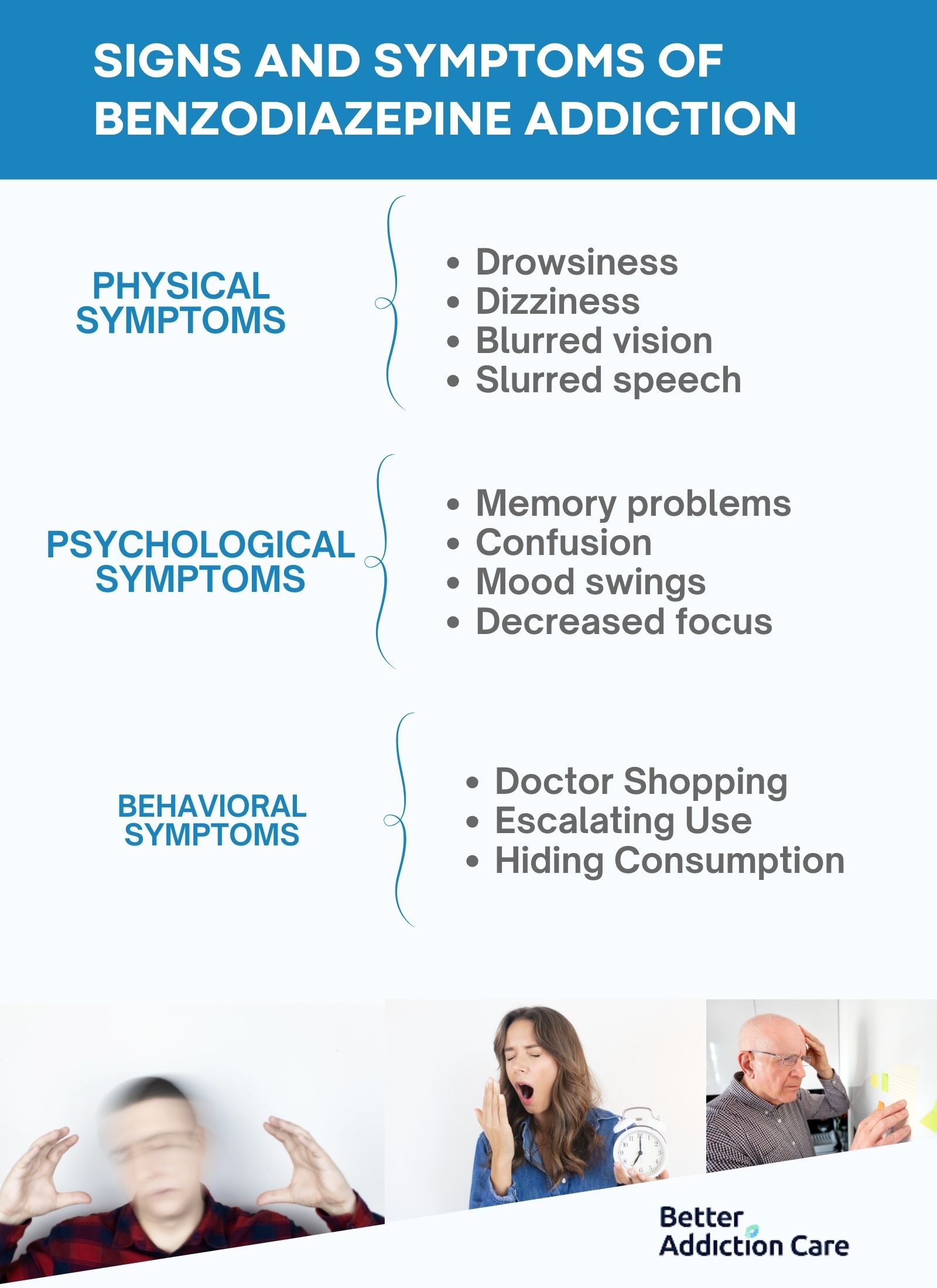
The signs and symptoms of Benzodiazepine include a combination of physical, psychological, and behavioral signs and symptoms that collectively show the harmful impact of its addiction.
The major signs and symptoms of Benzodiazepine addiction are listed below:
Physical symptoms
The physical symptoms of benzodiazepine addiction are listed below.
-
Drowsiness: Benzodiazepine leads to drowsiness and sleepy behavior as it creates a sedating effect on the brain.
-
Dizziness: The medicine creates a confusing state in which the surroundings feel like spinning leading to dizziness.
-
Blurred vision: Benzodiazepine leads to dry mouth and dry eyes due to a compound present in it namely Acetylcholine. The dry eyes make it difficult to maintain clear vision, as per a study on “The effect of long-term use of benzodiazepines on the eye and retina” by S N Stafanous.
-
Slurred speech: Benzodiazepine causes slurred speech mainly due to the effect of muscle weakness and sedative state of mind.
Psychological Symptoms
The psychological symptoms of benzodiazepine addiction are listed below.
-
Memory problems: Anterograde amnesia is a common symptom of Benzodiazepine addiction that causes memory issues.
-
Confusion: Benzodiazepine addiction creates a dizzy state of mind leading to confusion and instability.
-
Mood swings: Long-term use of Benzodiazepine worsens anxiety and insomnia leading to constant mood swings.
-
Decreased focus: Benzodiazepine interferes with motor coordination and hence leads to disturbed focus. Several cognitive domains are impacted by an elongated exposure to the medicine, as per a study on “The effects of benzodiazepines on cognition.”
Behavioral Symptoms
The behavioral symptoms of benzodiazepine addiction are listed below.
-
Doctor Shopping: The addiction to Benzodiazepine makes the patient visit the doctor’s office more than often to constantly obtain the medicine.
-
Escalating Use: Benzodiazepine addiction makes people want to take an extra dosage than recommended, resulting in escalated intake.
-
Hiding Consumption: People with benzodiazepine addiction tend to lie and hide their consumption to avoid withdrawal and interventions.
What Are The Causes Of Benzodiazepine Addiction?
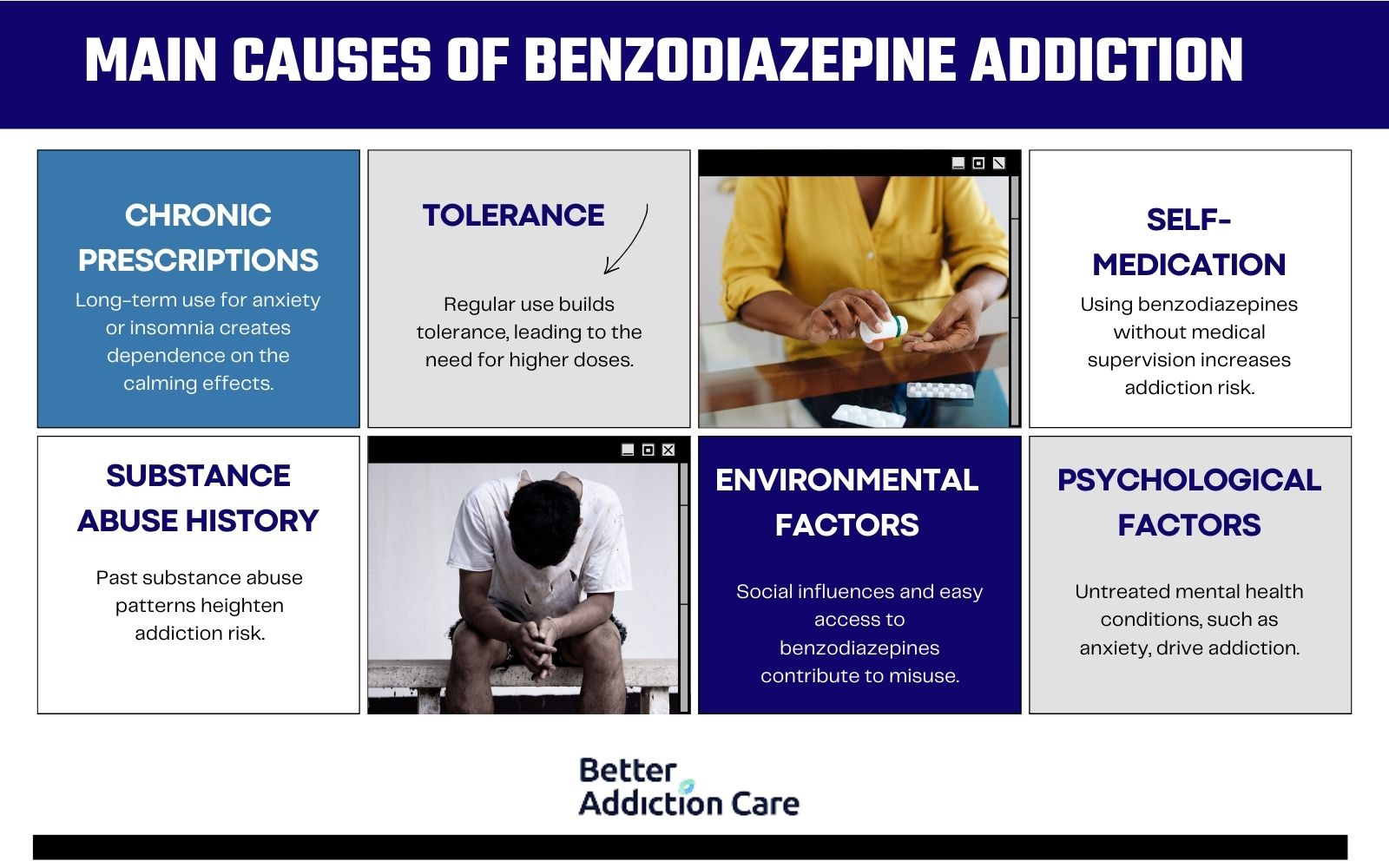
The 6 causes of Benzodiazepine addiction include prescriptions for chronic anxiety or insomnia, tolerance, mental health conditions, self-medication, history of substance abuse, psychological factors, and environmental factors.
The main causes of benzodiazepine addiction are listed below:
-
Prescriptions for chronic anxiety or insomnia: Benzodiazepine is prescribed for the treatment of anxiety and insomnia. The calming and sedative effect makes people addicted to this state. Prolonged usage creates the need for dependence.
-
Tolerance: Tolerance development occurs when the body becomes used to the regular usage of this medicine. A higher level of tolerance develops the need for higher and more frequent doses.
-
Self-medication: Self-medication is the state when people treat their illness on their own without a medical prescription. The act of self-medication without moderation in doses leads to benzodiazepine addiction.
-
History of substance abuse: The history and pattern of a person’s interaction with substance abuse increases the risk of benzodiazepine addiction.
-
Psychological factors: Psychological factors like mental health conditions and emotions are the driving forces of addiction development. People with untreated anxiety and insomnia are likely to seek comfort within benzodiazepine, as per a study on “Risks Associated with Long-Term Benzodiazepine Use”, by Brain Johnson.
-
Environmental Factors: Environmental factors include the surroundings and societal behaviors that lead to substance abuse. Social influence and ease of access to benzodiazepine are major forms of environmental factors leading to its addiction.
What Are The Effects Of Benzodiazepine Addiction?
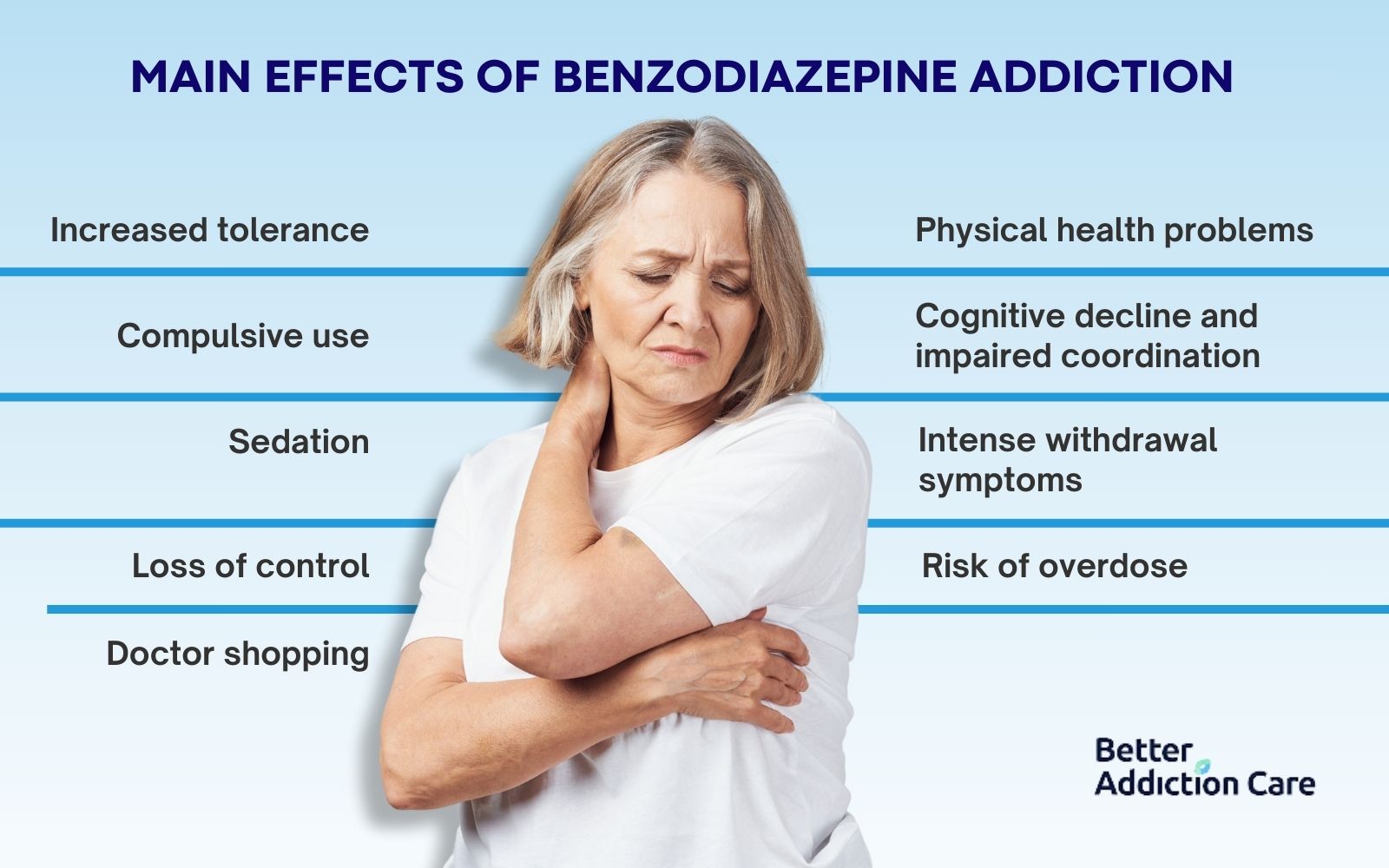
The 9 effects of benzodiazepine addiction are increased tolerance, compulsive use, sedation, loss of control, doctor shopping, physical health problems, cognitive decline impaired coordination, intense withdrawal symptoms, and risk of overdose.
The main effects of benzodiazepine addiction are listed below:
-
Increased tolerance: The long-term usage of benzodiazepines leads to increased tolerance levels of it. People with increased tolerance levels of benzodiazepine require higher doses to gain the same effect as earlier.
-
Compulsive use: Benzodiazepine addiction creates constant dependence on it for brain relief, resulting in a compulsive usage of medicine.
-
Sedation: Benzodiazepine acts on the CNS to create a sedative and relieving effect. Benzodiazepine addiction leaves the body in a constant state of sedation.
-
Loss of control: Benzodiazepine addiction is known to disrupt cognitive domains, leading to lesser control over the mind and body. The dizziness and confusion make the person remain in a nearly unconscious state.
-
Doctor shopping: Individuals with benzodiazepine addiction look for multiple treatment providers to get a maximum dosage of the medicine. The unavailability of medicine without a prescription makes people go doctor shopping for it, as per a study on doctor shopping by Randy A Sansone.
-
Physical health problems: Physical health issues are the visible problems that occur with long-term dependence on benzodiazepine. Dizziness, drowsiness, and blurred vision are some common signs of physical health problems associated with the addiction.
-
Cognitive decline and impaired coordination: The effect of benzodiazepine on the cognitive domain leaves the brain coordination impaired. The brain’s working ability declines as the medicine’s usage and dependency increase.
-
Intense withdrawal symptoms: Withdrawal symptoms are the body’s reaction in physical and psychological form upon dosage cut down. The body develops dependency and upon cutting down the dosage, it reacts.
-
Risk of overdose: Risk of overdose leads to fatal consequences. Benzodiazepine is prescribed in a moderate amount. The increased urge and addiction lead to the risk of overdose.
How to Identify Benzodiazepine Addiction?
To identify Benzodiazepine addiction check the visible signs and symptoms. Physical signs like dizziness, slurred speech, and blurry vision are common indicators. Behavioral changes like the urge to increase the dosage. Other signs like memory issues and an absent state of mind are common indicators of benzodiazepine addiction. A combination of some of these signs indicates the onset of addiction.
What Are The Treatment Options For Benzodiazepine Addiction?
The 4 treatment options for benzodiazepine addiction are behavioral therapies, detoxification, support groups & rehab centers, and medications.
The main treatment options for benzodiazepine addiction are listed below:
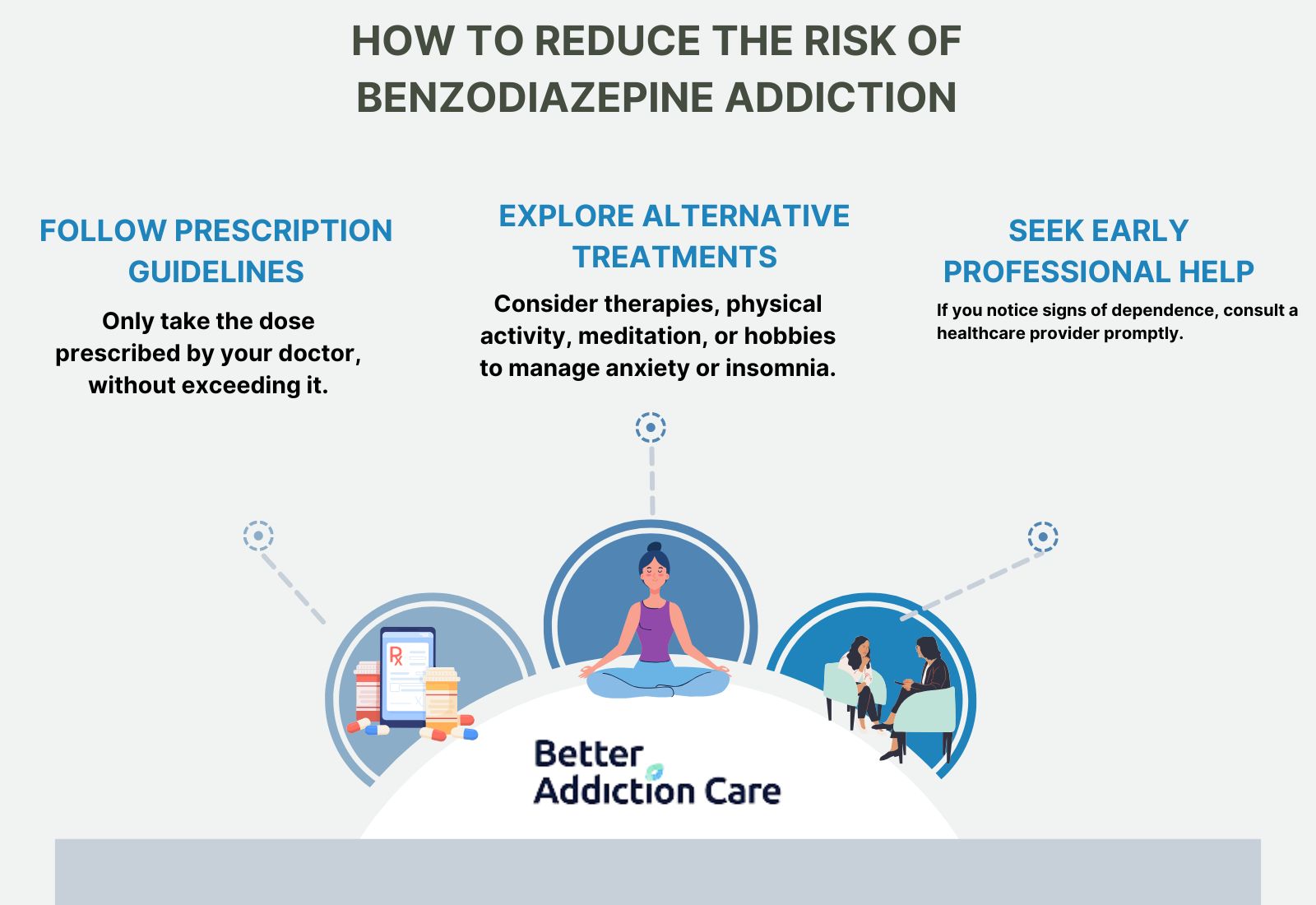
-
Behavioral therapies: Behavioral therapies are therapeutic techniques that help to address the root cause of addiction. During the session, a therapist tries to understand the behavioral and cognitive aspects of the patient’s addiction. The expert recommends further treatment based on the findings.
-
Detoxification: Detoxification is a medical process that helps to eliminate any drug toxins present in the body. Medically monitored withdrawal of benzodiazepine aids in the detoxification process.
-
Support groups & rehab centers: Support groups and rehab centers help the patient to get help from a community. People with similar addiction issues open up, engage in activities, and discuss under an expert’s supervision.
-
Medication: Medication along with other treatments like therapy helps to treat benzodiazepine addiction. Doctor’s recommended medication doses help to alleviate the addiction effects.
How to Reduce the Risk of Benzodiazepine Addiction?
To reduce the risk of Benzodiazepine addiction, you should follow prescription guidelines, use alternative treatments for anxiety or insomnia, and seek professional help early for signs of dependence.
-
Follow prescription guidelines: Benzodiazepine dosage is based on the required amount prescribed by the medical expert. Do not exceed the prescribed dosage to keep the risk of addiction to a minimum.
-
Use alternative treatments for anxiety or insomnia: if you have a fear of benzodiazepine addiction, try other treatment methods for anxiety and insomnia. Try therapy, increased physical activity, meditation, and mind diversion through hobbies.
-
Seek professional help early for signs of dependence: If early signs are visible, make sure to get professional help right away before the risk of serious addiction.
How Does Benzodiazepine Addiction Compare to Other Drug Addictions?
Benzodiazepine addiction differs from other drugs based on its effects, usage, intake methods, and availability. The severity of benzodiazepine addiction. Benzodiazepines are known for severe dependence and withdrawal symptoms, unlike other drugs like opioids and stimulants.
What are the unique risks of benzodiazepine addiction compared to PCP misuse?
The unique risks of benzodiazepine addiction compared to PCP misuse include a confused state, constipation, and slurred speech. Benzodiazepines are medicines that are prescribed to treat anxiety disorder. PCP is a hallucinating and sedative drug with anesthetic effects. Both drugs are addictive. However, PCP addiction is known to be highly life-threatening.
How Do The Withdrawal Challenges Of Benzodiazepines And Ketamine Compare?
Withdrawal challenges of benzodiazepine are complex in comparison to ketamine addiction withdrawal. Benzodiazepine withdrawal symptoms include anxiety, insomnia, depression, shaking, sweating, and panic attacks. Ketamine withdrawal symptoms are psychological including confusion, insomnia, and cognitive impairment. Ketamine is a hallucinating drug prescribed to treat depression. Benzodiazepines are prescribed to treat anxiety and insomnia. Both drugs are potentially addictive.
What Is The Conventional Treatment For Benzodiazepine Dependence?
Conventional treatment for benzodiazepine dependence is gradual dose reduction known as "benzodiazepine tapering." According to Hood, S. D.'s 2014 study, 'Benzodiazepine dependence and its treatment with low dose flumazenil., benzodiazepine tapering extends over several weeks or months with patients experiencing withdrawal symptoms and cravings that contribute to high dropout rates. The treatment protocol involves a gradual reduction in benzodiazepine dosage, sometimes with a transition to longer half-life benzodiazepines. Psychological support ranging from basic counseling to structured cognitive behavior therapy supplements the tapering process. For patients with severe dependence, inpatient tapering programs lasting 2-4 weeks or longer are the standard recommendation, though completion rates remain low with studies showing only 10 out of 44 patients successfully finishing an 8-day inpatient protocol.
How Long Does Benzodiazepine Withdrawal Last?
Benzodiazepine withdrawal typically lasts 10-14 days for the full-blown syndrome. According to Pétursson H.'s 1994 study, 'The benzodiazepine withdrawal syndrome.', benzodiazepine withdrawal follows several patterns: a short-lived "rebound" anxiety and insomnia occurring within 1-4 days after discontinuation, the full-blown withdrawal syndrome lasting 10-14 days, and a return of anxiety symptoms that persist until treatment is instituted. The article states withdrawal symptoms appear more severe following discontinuation from high doses or short-acting benzodiazepines.




